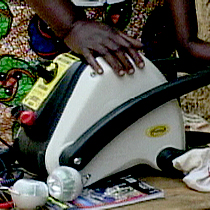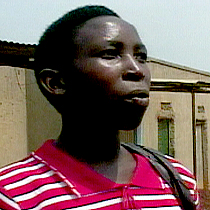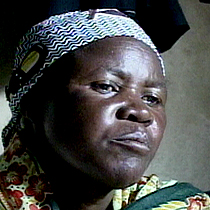2007年VOA标准英语-Rwandan Women Take Steps to Help Themselves(在线收听)
Rwimiyaga, Rwanda
19 July 2007
Many women in Rwanda are struggling to lift themselves out of poverty. The 1994 genocide left large numbers of them widows. With the support of international agencies, one group of women in northern Rwanda has come up with two innovative ways of making money. Cathy Majtenyi went to the town of Rwimiyaga and files this report for VOA.
 |
| The WEZA machine is a generator that can be pumped by foot or hand |
It is a generator that can be pumped by foot pump or hand and then used to re-charge small electronic devices such as mobile phones or lights.
The women set up their booth close to the market place.
About five to 10 customers per day come, mostly with their mobile phones to be recharged. They pay 100 Rwandan francs, or almost 20 cents, for the service.
The transactions are carefully recorded and revenues deposited into the group's bank account.
 |
| Solange Mukantako |
"I use the telephone to get information from Kigali,” she explains. “I have a boutique. I go to Kigali to buy goods and sell them here. Before I go to Kigali, I can ask if the goods are ready there and what the prices are."
The World Bank and a British group, Freeplay Foundation, help make the generator available to the women. The international aid agency Care distributes the machine in five districts in the country and provides training on how to use the machine.
The 20-member women's association in this northern Rwandan town had organized themselves and approached Care last year, asking the agency if it could help the women start up income-generating activities.
Besides buying the WEZA machine, the group also earns money through a telephone service. Care and the Grameen Foundation helped set the phone service up six months ago.
The women employ Cansilde Tumukunde, who owns a tailoring shop, to run the telephone service. She says she gets from 10 to 20 customers a day. She has one of four public telephones in the town.
 |
| Genevieve Mukansanga |
With the money they earn from the WEZA machine and telephone service, the women have formed a revolving loan system that they can use for their individual businesses such as growing and selling sorghum, bananas and making banana juice.